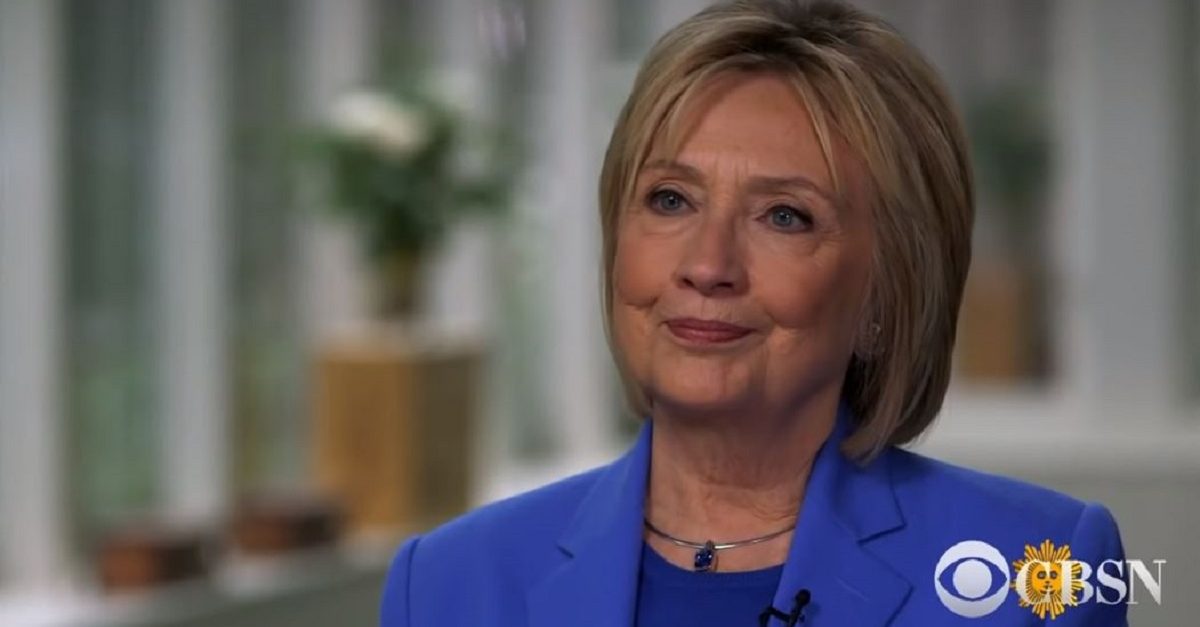
We interrupt the hellscape that is 2020 with the news that we are somehow still talking about Hillary Clinton’s emails.
Clinton’s legal team argued before the D.C. Circuit Court of Appeals on Tuesday against a Freedom of Information Act (FOIA) lawsuit filed by conservative watchdog group Judicial Watch. Clinton was noticed for an in-person deposition, and argued against attending. U.S. District Court Judge Royce C. Lamberth ruled against Clinton in March, saying she had to be deposed in person. After that, Clinton’s team pulled out an interesting and seldom-successful legal maneuver: they filed a petition for mandamus against the judge. Mandamus is a legalese for “forcing a government official to do their job properly.”
Typically, litigants unsatisfied with adverse rulings simply appeal those rulings; petitioning for mandamus is far from a go-to legal strategy. And yet, two very high-profile cases hit courtrooms this week, both hoping that mandamus will save them.This particular case is extra odd, even for mandamus cases.
The appellate court first invited and then ordered the DOJ to come to oral arguments over Clinton’s deposition.
At those arguments on Tuesday, lawyers for Clinton (and her longtime aide Cheryl Mills, who was also noticed for a deposition) argued that Clinton and Mills have already turned over tens of thousands of messages, and that the real purpose for the depositions was to harass them on the national stage. Clinton’s attorney, David Kendall, called the deposition “social media fundraising” and said that Judicial Watch sought it solely to create “video footage that can be used for partisan, political attack ads.”
Whatever one thinks of Benghazi and the emails and the SCIF and all of that, though, there appears to be something just under the surface here that requires a little attention. The Justice Department was not nearly as interested in saving former Secretary of State Hillary Clinton from a deposition as it was from rescuing Donald Trump, Commerce Secretary Wilbur Ross or former Vice President Dick Cheney from depositions. The difference may be related to the fact that there’s another high-profile mandamus case going on in the D.C. Circuit. That one is about the prosecution of Michael Flynn.
The D.C. Circuit ordered U.S. District Judge Emmet Sullivan to explain why he did not to immediately dismiss the Flynn prosecution, despite the DOJ’s motion to drop the case. Sullivan responded, as ordered, by Monday. The appellate court ordered this explanation after Flynn’s legal team filed an emergency petition for a writ of mandamus in the hopes that Sullivan would be directed to dismiss the case. On Tuesday night, the D.C. Circuit ordered oral arguments in the case.
On the Flynn case, Judge Sullivan’s lawyer Beth Wilkinson wrote that “It is unusual for a criminal defendant to claim innocence and move to withdraw his guilty plea after repeatedly swearing under oath that he committed the crime.”
“It is unprecedented for an Acting U.S. Attorney to contradict the solemn representations that career prosecutors made time and again, and undermine the district court’s legal and factual findings, in moving on his own to dismiss the charge years after two different federal judges accepted the defendant’s plea,” they argued.
The DOJ went to bat Flynn against Sullivan, saying that although a writ of mandamus is “drastic and extraordinary” it is entirely appropriate and warranted in this case.
“The district court plans plans to subject the Executive’s enforcement decision to extensive judicial inquiry, scrutiny, oversight, and involvement. Under the Supreme Court’s and this Court’s precedents, it is clear and indisputable that the district court has no authority to embark on that course,” DOJ concluded.
Oral arguments in the Clinton case were held telephonically due to the pandemic – and went nearly three times longer than the court had scheduled. During the arguments, both Judge Nina Pillard (a Barack Obama appointee) and Judge Thomas Griffith (a George W. Bush appointee) called mandamus an “extraordinary” remedy to be used only rarely.
Those statements seemed to dovetail with Judicial Watch’s argument against mandamus, calling such a writ the “most potent weapon in the judicial arsenal.”
Mark Freeman, arguing on behalf of the DOJ, said that Clinton’s would-be deposition was different from past cases in which the DOJ did oppose the depositions of high-level policymakers. And how’s this for some more legal crossover? Judge Sullivan was the one who slammed Clinton’s use of a private email server, saying that, “we wouldn’t be here today if this employee had followed government policy.” What’s more, Beth Wilkinson represented Clinton staffers during the FBI investigation into the former Secretary of State’s use of a private server.
While the Flynn case was not specifically mentioned during Tuesday’s oral arguments, it loomed large in the courtroom. Circuit Judge Robert Wilkins (another Obama appointee) is currently the only judge assigned to both the Clinton case and the Flynn case. However, as these cases proceed, it is possible that the entire D.C. Circuit could eventually join the fray.
[screengrab via CBS]